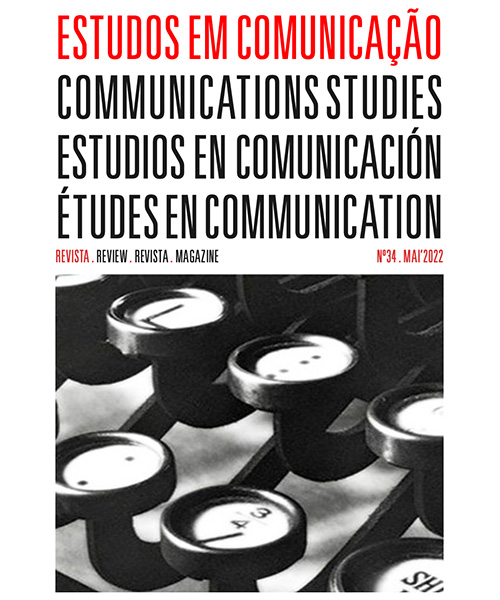Mobility, immersion and experience: between adjustments and conceptual disagreements in immersive journalism
Keywords:
immersive journalism, immersion, experience.Abstract
This paper aims to raise and analyze some of the main recent theoretical reflections that critically address the concept of immersive journalism and point out other terms to define specific journalistic products that invest in immersion and experience, in a context of information consumption through mobile devices. It represents a deepening of a previous study that follows the use and development of the concept of immersive journalism, through meta-research and bibliometrics. As a result, we present a comparative picture of the theoretical approaches raised that point to a trend of theoretical-conceptual turn in these researches.
References
Barbosa, S. (2007). Jornalismo Digital em Base de Dados (JDBD) – um paradigma para produtos jornalísticos digitais dinâmicos. Tese (Doutorado, Faculdade de Comunicação, Universidade Federal da Bahia, Salvador).
Benítez, M. J. G. (2019). El reportaje inmersivo con vídeo en 360º: características, buenas prácticas y empleo por parte de los medios periodísticos españoles. Tese (Doutorado, Universidad Carlos III de Madrid. Orientadora: Dacil Susana Herrera Damas.
Boczkowski, P. (2021). Abundance. On the Experience of Living in a World of Information Plenty. United States of America: Oxford University Press.
Busselle, R., e Bilandzic, H. (2009). Measuring Narrative Engagement. Media Psychology, 12 (4), p. 321-347.
Canavilhas, J. (2021). (2021). Epistemology of mobile journalism. A review. Profesional de la información, 30, (1), p. 1-21.
De La Peña, N., Weil, P., Llobera, J., Giannopoulos, E., Pomés, A., Spanlang, B., Friedman, D., Sanchez-Vives, M., e Slater, M. (2010). Immersive Journalismo: Immersive Virtual Reality for the First Person Experience of News. Presence, 19 (4).
De La Peña, N. (2019). Inventing Immersive Journalism: Embodiment, Realism and Presence in Nonfiction. Tese (Doutorado, Faculty Of The Graduate School University Of Southern California).
Dijck, J. V., Poell, T., e Waal, M. (2018). The platform society. Public values in a connective world. New York: Oxford University Press.
Domínguez, E. (2013). Periodismo inmersivo. Fundamentos para una forma periodística basada en la interfaz y en la acción. Tese (Doutorado, Universitat Ramon Llull, Barcelona).
Fonseca, A. (2020). A imersão como categoria estruturante e indutora de inovações no jornalismo em redes digitais. Tese (Doutorado, Faculdade de Comunicação, Universidade Federal da Bahia, Salvador).
Fonseca, A., Lima, L., e Barbosa, S. (2019a). Jornalismo imersivo: dez anos de pesquisa e produções. International Journal nn Stereo & Immersive Media, 3 (1), p. 72-89.
Fonseca, A., Lima, L., e Barbosa, S. (2019b). Uma Proposta de Framework Teórico para Análise da Experiência no Jornalismo Imersivo. Atas de conferência, XXVIII Encontro Anual da Compós, Pontifícia Universidade Católica do Rio Grande do Sul, Porto Alegre.
Fonseca, A., Lima, L., e Barbosa, S. (2020a). Diez años de periodismo inmersivo: diagnóstico y proposiciones para la investigación científica. Livro de resumos do II Congreso Internacional Periodismo y Comunicación Global.
Fonseca, A., Lima, L., e Barbosa, S. (2020b). Uma Proposta de Framework Teórico para Análise da Experiência no Jornalismo Imersivo. E-COMPÓS, 23, p. 1-30.
Grau, O. (2003). Virtual Art: from illusion to immersion. Cambridge, Massachusetts, London, England: MIT press.
Green, D., Rose, M., Bevan, C., Farmer, H., Cater, K., Fraser, D. (2021). ‘You wouldn’t get that from watching TV!’: Exploring audience responses to virtual reality non-fiction in the home. Convergence: The International Journal of Research into New Media Technologies, v. 27, n. 3, p. 805–829.
Longhi, R. (2020). Narrativas Complexas no Ciberjornalismo. Interface, Imagem, Imersão. Em Longhi, R., Lovato, A., e Gifreu, A. (Orgs.). Narrativas Complexas. Aveiro: Ria Editoral.
Longhi, R., e Caetano, K. (2019). Valor-experiência no contexto do jornalismo experiencial. Galáxia (online), n. 42, p. 82-95, 2019.
Murray, J. (2003). Hamlet no Holodeck: o futuro da narrativa no ciberespaço. Tradução: Elissa Khoury Daher e Marcelo Fernandez Cuzziol. São Paulo: Itaí Cultural: Editora Unesp.
Newman, N. (2019). Journalism, Media and Tecnology Predictions 2018. Reuters Institute for the Study of Journalism. Disponível em: <https://reutersinstitute.politics.ox.ac.uk/our-research/journalism-media-and-technology-trends-and-predictions-2019> Acesso em 14 set. 2021.
Omena, J. (2019). O que são métodos digitais? Em Omena, J. (Ed.). Métodos digitais: teoria-prática-crítica. Lisboa, Portugal: ICNOVA - Instituto de Comunicação da Nova.
Pavlik, J. (2019). Journalism in the Age of Virtual Reality: How Experiential Media Are Transforming News. New York: Columbia University Press.
Pérez-Seijo, S. (2021). Periodismo Inmersivo Con Vídeo 360 Grados: Evolución, Experiencia de Usuario y Producción de las Radiotelevisiones Públicas Europeas. Tese (Doutorado, Universidad de Santiago de Compostela).
Rocha, G. (2020). Representação virtual jornalística: proposta de matriz para análise de conteúdos jornalísticos em realidade virtual. Tese (Doutorado, Pontifícia Universidade Católica do Rio Grande do Sul). Rodrigues, L. (2021). OLHAR AO REDOR: pedagogia dos vídeos esféricos para o telejornalismo. Tese (Doutorado, Centro de Arte e Comunicação, Universidade Federal de Pernambuco).
Uskali, T., e Ikonen, P. (2020). Teaching Immersive Journalism. Em Uskali, T., Gynnild, A., Jones, S., e Sirkkunen, E. (Eds.). Immersive Journalism as Storytelling. Ethics, Production, and Design. Edição Kindle. Oxon e New York: Taylor and Francis.
Downloads
Published
Issue
Section
License
Estudos em Comunicação/Communication Studies is an Open Access journal. All its content is freely available without charge to the user or his institution. Users are allowed to read, download, copy, distribute, print, search, or link to the full texts of the articles in this journal without asking prior permission from the publisher or the author. Estudos em Comunicação, by Labcom, is licensed under a Creative Commons Atribuição-NãoComercial-SemDerivações 3.0 Unported License. By submitting your work to Estudos em Comunicação/Communication studies you confirm you are the author and own the copyright, that the content is original and previously unpublished, and that you agree to the licensing terms.


